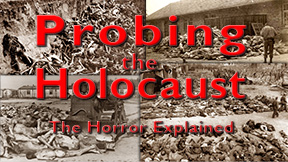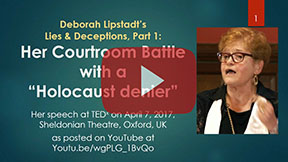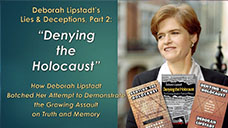I admit I have nothing to do with either Günter Grass, whose writings I do not like, or Elie Wiesel, whose pathetic babblings – whether written or spoken – I detest. When Grass criticized Israel in a recently written piece which the media called a “poem” for some inscrutable reason (there is neither rhyme nor rhythm in it, and the German language is butchered), he drew fire from many quarters, the ineluctable Elie among them. What a tempest in a tea cup! I wouldn’t have bothered wasting my time with it, had it not been for Carolyn Yeager, whose hobby it is to go after Elie like the devil goes after the poor soul – or maybe here it is the other way around. Anyway, in Yeager’s blog entry about that affair people somehow ended up talking about me and my attitude toward Jews – how did they get that curve?
Anyway, Jett Rucker, whom I respect very much, commented Yeager’s piece as follows on April 18, 2012, at 8:33 am:
“I’m discouraged by the cant in this post that ‘Jews and Germans can never reconcile.’ This echoes Wiesel’s own infamous paean to hatred that ‘Jews should retain a healthy hatred for Germans in the present day.’
No less than Germar Rudolf has published a very uplifting review of past symbiosis between the peoples (before and during World War I). I side with Rudolf in his hopes for future co-existence such as he delineates in his foreword to Dissecting the Holocaust.”
Carolyn Yeager responded to this on that same day at 7:20 pm by writing:
“To Jett Rucker: Dissecting the Holocaust came out in 1994 under an assumed name, Ernst Gauss. Rudolf at that time was young, idealistic and naïve. He also knew he had embarked on a dangerous path as a ‘holocaust revisionist.’ He was doing his best, I’m sure, to not be called an antisemite. I don’t believe he was then or is now an antisemite. But would he write the same today? You say you ‘side with Rudolf’ but you are speaking of something Rudolf wrote 18 years ago, under very different circumstances.
In an article by Rudolf published in the spring 2012 Journal of Inconvenient History (not dated anywhere – why not? I’m not sure when he wrote it) he compared his experience in Germany with that of the Jews who were also held in detention in the 1940′s. But that is all. He pointed out that the logic behind the ‘holocaust laws’ is to make the ‘human dignity of all Jews — from then and now — depend on everyone accepting the orthodox Holocaust narrative.’ This human dignity for Jews ‘has priority over everything else,’ he said, meaning priority over dignity for Germans. Then he discussed how this denies the search for truth.
While this holocaust law is enforced by the German State, it is the Jews who demand it, and it is the United States government and its military power with its strong Jewish Lobby that dictates to Germany what it must do. (Not that the liberal, anti-nationalist political parties in Germany aren’t happy to do it.) It was a Jew who reported Horst Mahler’s raised arm greeting to the legal authorities, resulting in a 13-year prison sentence for a man in his 80′s. Jews have not changed for several thousand years; there is no reconciliation with Jews if non-Jews want their dignity and true history. That is not ‘cant’ but reality.”
To answer Carolyn’s question as to when I wrote that paper: it is a summary, with a few added remarks, of my book with the same title dealing with my 2006/2007 trial in Germany which was published this month (April 2012): Resistance is Obligatory. I put that paper together on January 7, 2012, following a request by the editor of Inconvenient History.
Jett Rucker informed me about his and Carolyn’s above remarks about me, so I felt obliged to set the record straight as to what my attitude is today. Here is what I asked Carolyn to post as my comment, which she did on April 19, 2012 at 3:08 pm:
“Since you guys are talking about me and my views, permit me to make my own comments, whatever it is worth. Jett Rucker is right in assuming that my attitude has not changed. Although I am aware that many Jews are a major driving force behind the persecution machinery which made my life miserable at times, I try not to commit the flawed generalization error of ‘some of them nefarious, all of them nefarious.’ That disastrous generalization is exactly what they have done to us Germans after the war, and I won’t do to others what I don’t want to see done to my kin. As a matter of fact, since 1994 I have had several wonderful opportunities to experience Jews who were neither hate- nor vengeful when confronted with a revisionist, but rather compromising, understanding and accommodating. Among them are a former girlfriend and part of her family. This and other experiences immunized me against any temptation of speaking of ‘the Jews,’ as is once more exemplified by Carolyn who wrote above, ‘Jews have not changed for several thousand years; there is no reconciliation with Jews if non-Jews want their dignity and true history.’ That’s not what I have experienced. For me the problem is Zionism, both the Jewish and the Christian variety. Christianity gives Judaism credence. Without it, the Jewish Stone Age religion would long since have disappeared. ‘Modern’ Judaism with the Holocaust at its core is a huge brainwashing ideology for both Jews and Christians. For an elucidating documentary about how Jews are brainwashed I strongly recommend the 2009 documentary ‘Defamation’ by Israeli documentary filmmaker Yoav Shamir (see at https://www.yoavshamirfilms.com/). This makes clear that most Jews have been made mentally sick with persecution paranoia and urgently need to be liberated from their own oppressive secular ideology. Driving them even deeper into that paranoia by helping the Zionist ideologues pit Jews against Gentiles makes things only worse for all of us.”
Carolyn has again posted her comments about it, but I will not reply there again, as it would distract from the original posting’s topic. Let me say here only that, although reconciliation does mean that two parties forgive each other as Carolyn states, it does not mean that any of them forgets the past. Our history is part of our identity, which we should never forget. Also, I can forgive a person or a group of persons without them forgiving me in return. Although that is not called reconciliation, it still is a necessary act of emotional hygiene. If we keep holding grudges or even hating others, we might not do harm to them, but we sure do harm to ourselves, because the key to happiness is not grudging and hating, quite to the contrary. That is my outlook on life. Hence my attitude toward my oppressors and persecutors and their kin isn’t primarily based on tactical considerations, as Carolyn imputes.
As to a past and a possible future German-Jewish symbiosis (or any other such constellation): here, too, focusing on the positive aspects of the past to envision a better future would be helpful. One thing is certain: if we don’t try, we won’t succeed.






